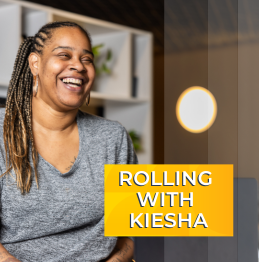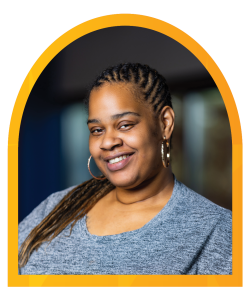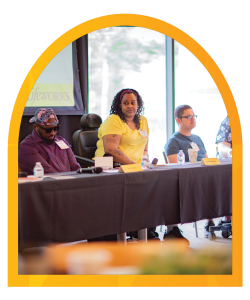
“I won’t settle for no unless it’s really no.” Kiesha has spent much of her life navigating complex challenges. Even as the challenges piled on, Kiesha developed a strong willingness to advocate for herself, whether alone or with the help of those around her. Kiesha knows what she needs to live her best life and won’t allow barriers to block her from achieving this vision for herself. So even when “no” is the answer she is used to hearing, she is unwilling to settle unless she has her say.
I won’t settle for no unless it’s really no.
Kiesha first connected with Lifeworks after one of the most challenging years of her life. In 2020, Kiesha underwent multiple amputation surgeries, including one to remove her right leg below the knee due to a severe ulcer. Since then, Kiesha has used a wheelchair and, increasingly, a walker to move around. During that same year, Kiesha lost her younger sister and mother. Kiesha barely had time to adjust to the changes in her life as she needed to focus on finding suitable housing for her and her two children. “In October, I became homeless again. Is this really happening?” she asked herself. “Like, every day I would wake up and [think] this has to be the most uncomfortable dream. Nope, this is really reality. This is really happening to you.” Kiesha experienced homelessness several times throughout that year. As the year went on, she couldn’t help but wonder what else could happen to her. She asks herself: “How many dominoes are left in this game?”
Experiencing homelessness exacerbated the other challenges and barriers Kiesha was facing. “It was very scary,” she recalls. “When I am in that position, when I feel like I’m homeless, I lose myself. My mental stability is gone. My thinking strategies are gone. It makes me relive a different life. And then my children. Having to explain to them why we got to be here and there and this and that. It’s difficult.” To support her family, who were living in South Dakota at the time, she moved back to Minnesota to access the assistance they needed. She was able to enroll her family in a shelter program that provided temporary housing and later moved to affordable housing. At this point, she felt that the support would extend no further. “I was in the shelter program. [I was] connected to a place in Lakeville. They took me out of homelessness and then just kind of put me in a spot and forgot about me.” Kiesha began to research what resources were available to her, leading to her first connection with Lifeworks.
 “I did some investigating because somebody’s gotta help me,” she says. She eventually came across a Facebook post from Dylan Croeker, a Resource Navigation coordinator at Lifeworks. Dylan’s post prompted Kiesha to learn more about navigation support with Lifeworks. She called and left a message, which Dylan returned a few days later. Kiesha had trouble connecting with other organizations, saying, “I was just leaving messages and calling anybody that would help people. Dylan was the first one to respond.”
“I did some investigating because somebody’s gotta help me,” she says. She eventually came across a Facebook post from Dylan Croeker, a Resource Navigation coordinator at Lifeworks. Dylan’s post prompted Kiesha to learn more about navigation support with Lifeworks. She called and left a message, which Dylan returned a few days later. Kiesha had trouble connecting with other organizations, saying, “I was just leaving messages and calling anybody that would help people. Dylan was the first one to respond.”
Dylan notes that Kiesha is one of the first people he connected with as a resource navigation coordinator. At the time, Kiesha had a housing worker and a disability case manager. Still, Dylan recognized that Kiesha needed assistance “pushing through the red tape.” Kiesha had mostly navigated the system of resources on her own and often felt like a “hockey puck” as she was referred back and forth between services and organizations.
Right off the bat, Kiesha developed a strong partnership with Dylan. One of the first goals she wanted to work on was finding housing that met her family’s wants and needs. “I was living in this apartment and couldn’t get around my bathroom. I was grateful for having a place, but it’s not safe. I would have to go to Mystic Lake to shower.” Kiesha wanted an apartment that was more accessible to her, could accommodate two kids, and was fundable by a Section 8 housing voucher. In previous housing searches, most options presented to Kiesha focused on her family being low-income. Dylan helped Kiesha advocate from the perspective of a person with a disability who needed an accessible space to live.
Through their partnership, Kiesha moved into an apartment that better fits her and her family’s needs, got her birth certificate from across the country, received support for her mental health, found pools and aquatic centers for exercise, and more. Every barrier that Kiesha faced was an opportunity for her to become more comfortable in advocating for herself. Kiesha adds, “It’s just sometimes I don’t know [how] to navigate and be professional about it. Aggressiveness comes, and I don’t know how to control that.” As she continued working with Dylan to achieve her goals, their partnership grew, and she gained helpful tools to advocate for herself. “Well, I feel like Dylan is Lifeworks, cause Dylan makes my life work. Get it?” she laughs before continuing: “He literally makes my life work. I felt, since navigating with him, life has definitely been easier to maneuver.”
He literally makes my life work. I felt, since navigating with him, life has definitely been easier to maneuver.
Even as Kiesha made progress on her goals, navigating the obstacles wasn’t always easy. Finding housing, for example, took a lot of coordination and effort between her and Dylan. “We had to go through some hoops to go through it. It was a big mess,” she says. In moments when the professionals weren’t able to provide the help she needed, her community stepped up. “That’s the one thing about you, though, is that every time you really needed someone to come through for you, it felt like someone was at least willing to try,” Dylan says to Kiesha.
 Kiesha is optimistic about her future and continues to partner with Dylan to navigate the system and access the resources she needs. She firmly believes in being able to live the life she wants to: “I’m trying to live my best life, you know, and like I said, with the help of Dylan and Lifeworks, I’m doing that.” While Dylan works to be the best advocate he can be for Kiesha, he believes there is still more that we can do to be partners for people with disabilities. “The concept of above and beyond, we are still below where we need to be. We need to recognize how much farther we have to go,” he says.
Kiesha is optimistic about her future and continues to partner with Dylan to navigate the system and access the resources she needs. She firmly believes in being able to live the life she wants to: “I’m trying to live my best life, you know, and like I said, with the help of Dylan and Lifeworks, I’m doing that.” While Dylan works to be the best advocate he can be for Kiesha, he believes there is still more that we can do to be partners for people with disabilities. “The concept of above and beyond, we are still below where we need to be. We need to recognize how much farther we have to go,” he says.
With her strength as an advocate for herself and a network of supporters in Dylan, her family, and friends, Kiesha can focus more on her relationship as a mother to her two children and exploring her passions, like making t-shirts and being involved in comedy. In true comedic fashion, Kiesha gives us a glimpse into her future as a comedian. “I had this little idea since, you know, I’ve been amputated, that I could no longer do stand-up comedy, [so] I wanted to change the world and bring in sit-down comedy; comedy on wheels because I’m in my chair. Trademark that! Rolling with Kiesha.”
